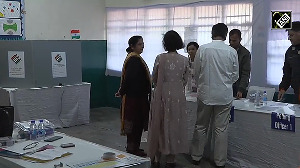Is the great Indian obsession with the male child on a decline?
If one were to go by the figures at New trend: More girls than boys adopted the Central Voluntary Adoption and Resource Agency -- CEVARA -- the government licensed coordination body, then educated, upmarket and childless couples are largely opting for the girl child.
Official figures too point to the fact: In 2003 out of 285 babies given for adoption, 161 were females and 124 males.
Of the 46 Non Resident Indians that took up babies for adoption, 38 girl children were given out as compared to eight males.
However, those in the placement agencies say there is more to than what meets the eye.
The trend is so not because the obsession with the male child is over, but because there are no male children available for adoption.
"The primary approach of an average Indian couple to adoption is still the same even after so many years," says Himadri Dey, administrator for a placement agency in Jungpura, New Delhi.
"The first request we generally get during registration of adopting parents is 'can we have a male child?'" he says. "However with time and social activism this attitude has changed to quite an extent," he adds.
The wait for a male baby is long, sometimes even three to four years, as there are "simply very few male babies that come to the homes for adoption."
"This might be the main reason why female babies are given out faster than the male child," says Saroj Tripathi, adoption officer at the Indian Council for Child Welfare, a government licensed scrutinising agency for adoption procedures.
"In 2002-2003 of the 550 cases that we scrutinised and given the green signal to, approximately 300 were female babies," she says.
"Initially most parents come looking for a male child, but through our counselling sessions, we try to convince them to take up a female baby instead," Tripathi says.
What most professionals agree to in unison that over the last 10 years a section of "educated, wealthy and well informed childless couples opt voluntarily for female babies."
There are again those who just circumvent the entire process and approach private agencies and nursing homes directly, pay hefty sums to the parents or middlemen and take male babies home.
"While the central government has issued a circular recently strictly restricting the adoption of babies from private unlicenced agencies, there is a loophole in the Hindu Adoption and Maintainance Act that gives the right to adopting parents to directly approach the birth mother and if she so consents, proceed on adoption from her," says Laila Baig, Secretary, CEVARA.
The babies mostly come to the placement agencies through either the police, are left in the cradles that stand outside these agencies by single mothers who can't keep the child or are donated formally by the parents themselves who are too poor to support the child.
Dey says parents rarely give up a male child.
Often, after a string of many daughters, unwanted girl babies are left at the homes by the natural parents.
Adopting parents desperate for a child but unwilling to go through either the long wait or the procedures, "get admitted to the private nursing home at the same time that a woman would deliver, and then on would leave the place with her baby," case workers say.
While the Indian obsession with fair skin and sharp features have left many children waiting in these homes for years, field professionals say this is one prejudice that they can't seem to make adopting parents get rid of.
"Most people would not take a baby with a flat nose or chinky eyes. They insist on an HIV test and demand a fair skinned child," says Tripathi.
The same goes for handicapped children. "For the last 10 years we could rarely place a handicapped child with any decent families. No one wants a child with polio or Down's Syndrome or even a minor handicap like blindness in one eye or fingers missing," says Tripathi.
While most case workers are trying hard to bring up the awareness level into adopting parents, they say it is a long way to go before typical traditional Indian prejudices are entirely uprooted.






 © 2025
© 2025